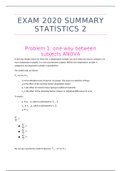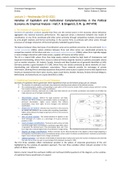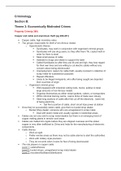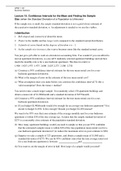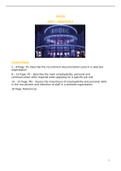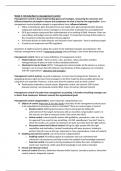Investment analysis
Lecture 1: chapter 1. the Investment Environment + chapter 2. Asset Classes and Financial
instruments
You invest because you also want to consume in the future. So, what you are doing when
investing, is that you are giving up consumption now in order to consume in the future.
You can invest in:
- Real assets: assets used to produce goods and services (land, buildings, machines)
- Financial assets: claims on real assets (stocks, bonds)à three types of financial
assets:
o Fixed-incomeà promise either a fixed stream of income or a stream of
income determined by a specific formula.
o Equityà represents an ownership share in the corporation. Equity holders
are not promised any particular payment. They receive any dividends the firm
may pay and have prorated ownership in the real assets of the firm.
o Derivativesà they provide payoffs that are determined by the prices of other
assets such as bond or stock prices.
Financial markets and the economy
- Information role of financial marketsà financial markets play a central role in the
allocation of capital resources
- Consumption timing
- Allocation of risks
- Separation of ownership and managementà agency issues
The investment process
Portfolio: collection of investment assets
- Asset allocation (choice among broad asset classes)
- Security selection (choice of securities within each asset class)
Security analysis- valuation
- Top-down- asset allocationà pick securities
- Bottom-up- you can also say I don’t care about asset allocation; I only invest in
companies that are very attractively priced
Markets are competitive
There is a difference between active management and passive management, active is really
like trying to time the market, so to determine like ok now this is the time to invest now I
can have return. Active management is expensive because you trade a lot.
Risk-return trade-off
- Assets are priced in line with its risks
- You would rarely expect to find bargains in security markets
Active management
- Finding mispriced securities
- Timing the market
,à but, you have to ask yourself whether active management is really ‘profitable’- trading
costs/management fees
Passive management
- No attempt to find undervalued securities
- No attempt to time the market
- Holding a highly diversified portfolio
à trading costs/management fees are much lower than in case of active management.
Funds such as ETFs are passively run ‘index’ trackers with very low fees and are becoming
more and more popular.
The players
- Firms- net borrowers
- Householders- net savers
- Governments- can be both borrowers and savers
- Financial intermediaries (Investment companies, pension funds, banks and insurance
companies)
- Investment banks
o Perform specialized services for businesses, for example IPO, SEO/SPO
o Handles the marketing of securities in the primary market
- Venture capital (VC)- active role in management of start-up
- Private equity- investment in not publicly traded firms
Financial markets
- Money markets- short term, liquid, low-risk
o T-billsà the government raises money by selling bills to the public investors.
Investors buy the bills at a discount from the stated maturity value. At
maturity, the government pays the investor the face value of the bill. The
difference between the purchase price and ultimate maturity value
constitutes the investor’s earnings.
o Certificates of deposità a time deposit with a bank. Time deposits may not
be withdrawn on demand
o Commercial paperà short-term unsecured debt issued by the company
o Bankers’ acceptanceà The banker's acceptance is a form of payment that is
guaranteed by a bank rather thanan individual account holder. The bank
guarantees payment at a later time
o Eurodollarsà dollar-denominated deposits at foreign banks or foreign
branches of American banks
o Repurchase agreementsà A repurchase agreement (repo) is a form of short-
term borrowing for dealers in government securities. In the case of a repo, a
dealer sells government securities to investors, usually on an overnight basis,
and buys them back the following day at a slightly higher price. That small
difference in price is the implicit overnight interest rate. Repos are typically
used to raise short-term capital. They are also a common tool of central
bank open market operations
o Federal fundsà funds in the bank’s reserve account
, o Brokers’ callsà The broker's call, also known as the call loan rate, is
the interest rate charged by banks on loans made to brokerage firms. These
brokers then use these loans, called call loans, to provide leverage to traders
using margin accounts. As their name suggests, call loans must be repaid
immediately—or "on call"—if so requested by the bank. If a broker believes
that their loans might be called, they may initiate a margin call on the traders
to whom they lent the funds.
o LIBOR is the premier short-term interest rate in Euro money market
- Capital markets- longer term, more risky
Bond marketà longer term borrowing or debt instruments:
- Treasury notes and bonds
- Corporate bonds
- Municipal bonds
- Mortgage securities
- Federal agency debt
Equity markets
common stock
- Ownership share
- 1 share 1 vote
- Board of directors, elected by shareholders (owners)
- Residual claim- last in line on assets an income
- Limited liability- max potential loss is original investment
- Dividend yield
- Capital gains
Preferred stockà features of equity and debt
- Fixed amount of income
- No voting power
- Obligation to pay interest, but not dividend
- Payments are treated as dividends, not tax-deductible for firm
Derivative markets
Derivative assetà a claim whose value is contingent on the value of some underlying asset
- Options (call/put)
o Right to buy or sell
o Exercises only when profitable
o Must be purchased (price)
- Futures
o Obligation to make or take delivery
o Obligation to buy/sell at futures price
o Contract are entered without costs
, Lecture 2: chapter 3. How Securities are Traded?
How firms issue securities
Firms raise funds by borrowing money or selling shares
- Primary market-new issues of securities
- Secondary market- trading existing securities on exchanges or in the OTC markets
(Over-the-counter or off-exchange trading is done directly between two parties,
without the supervision of an exchange.
If you are not listed, it has to go via the primary market
The advantage of being traded publicly, is that the people that own these shares can freely
sell them and then reap the benefits essentially of their investments.
Liquidity: the ability to buy or sell an asset at a fair price on short notice.
Both publicly listed firms and private corporations have shares, but the first are traded
publicly in markets, which the latter are held by a small number of managers and investors
(OTC).
Publicly traded companies
- IPOà you have an issuing firm that wants to be on the stock market and you have a
lead underwriter (which is typically and investment bank) and some other
investment banks. They together have and underwriting syndicate (some sort of
book) with which they promote the company to find people that want to invest in
the company
- SEO (seasoned equity offering)à The sale of additional shares in firms that already
are publicly listed.
- Public offerings of stocks/bonds are marketed by underwriters
IPO process
- Road shows
- Bookbuildingà the process of polling potential investors
- Underwriter bears price risk
o IPOs are commonly underpriced, in order to boost demand and encourage
investors to take a risk on a new company
o Some IPOs are overpriced (for example Facebook)
o Sometimes cannot be fully sold
In some cases, it’s possible that there is an IP0 not necessarily to raise capital, but to be
listed on the stock exchange, so that all the people that owner shares can freely sell them.
Which gives them more liquidity/more opportunity to have a return on their investment.
SPAC
Special Purpose Acquisition Company (SPAC) is a Shell company formed to raise capital
through and IPO in order to acquire an existing company. At the time of the IPO, SPACs have
no existing business operation or stated target for acquisitions. SPACs only assets are funds
raised through the IPO. ‘Blank Cheque’ company as IPO investors have no idea in what kind
of company they ultimately invest in. money raised through IPO is placed in interest-bearing
Lecture 1: chapter 1. the Investment Environment + chapter 2. Asset Classes and Financial
instruments
You invest because you also want to consume in the future. So, what you are doing when
investing, is that you are giving up consumption now in order to consume in the future.
You can invest in:
- Real assets: assets used to produce goods and services (land, buildings, machines)
- Financial assets: claims on real assets (stocks, bonds)à three types of financial
assets:
o Fixed-incomeà promise either a fixed stream of income or a stream of
income determined by a specific formula.
o Equityà represents an ownership share in the corporation. Equity holders
are not promised any particular payment. They receive any dividends the firm
may pay and have prorated ownership in the real assets of the firm.
o Derivativesà they provide payoffs that are determined by the prices of other
assets such as bond or stock prices.
Financial markets and the economy
- Information role of financial marketsà financial markets play a central role in the
allocation of capital resources
- Consumption timing
- Allocation of risks
- Separation of ownership and managementà agency issues
The investment process
Portfolio: collection of investment assets
- Asset allocation (choice among broad asset classes)
- Security selection (choice of securities within each asset class)
Security analysis- valuation
- Top-down- asset allocationà pick securities
- Bottom-up- you can also say I don’t care about asset allocation; I only invest in
companies that are very attractively priced
Markets are competitive
There is a difference between active management and passive management, active is really
like trying to time the market, so to determine like ok now this is the time to invest now I
can have return. Active management is expensive because you trade a lot.
Risk-return trade-off
- Assets are priced in line with its risks
- You would rarely expect to find bargains in security markets
Active management
- Finding mispriced securities
- Timing the market
,à but, you have to ask yourself whether active management is really ‘profitable’- trading
costs/management fees
Passive management
- No attempt to find undervalued securities
- No attempt to time the market
- Holding a highly diversified portfolio
à trading costs/management fees are much lower than in case of active management.
Funds such as ETFs are passively run ‘index’ trackers with very low fees and are becoming
more and more popular.
The players
- Firms- net borrowers
- Householders- net savers
- Governments- can be both borrowers and savers
- Financial intermediaries (Investment companies, pension funds, banks and insurance
companies)
- Investment banks
o Perform specialized services for businesses, for example IPO, SEO/SPO
o Handles the marketing of securities in the primary market
- Venture capital (VC)- active role in management of start-up
- Private equity- investment in not publicly traded firms
Financial markets
- Money markets- short term, liquid, low-risk
o T-billsà the government raises money by selling bills to the public investors.
Investors buy the bills at a discount from the stated maturity value. At
maturity, the government pays the investor the face value of the bill. The
difference between the purchase price and ultimate maturity value
constitutes the investor’s earnings.
o Certificates of deposità a time deposit with a bank. Time deposits may not
be withdrawn on demand
o Commercial paperà short-term unsecured debt issued by the company
o Bankers’ acceptanceà The banker's acceptance is a form of payment that is
guaranteed by a bank rather thanan individual account holder. The bank
guarantees payment at a later time
o Eurodollarsà dollar-denominated deposits at foreign banks or foreign
branches of American banks
o Repurchase agreementsà A repurchase agreement (repo) is a form of short-
term borrowing for dealers in government securities. In the case of a repo, a
dealer sells government securities to investors, usually on an overnight basis,
and buys them back the following day at a slightly higher price. That small
difference in price is the implicit overnight interest rate. Repos are typically
used to raise short-term capital. They are also a common tool of central
bank open market operations
o Federal fundsà funds in the bank’s reserve account
, o Brokers’ callsà The broker's call, also known as the call loan rate, is
the interest rate charged by banks on loans made to brokerage firms. These
brokers then use these loans, called call loans, to provide leverage to traders
using margin accounts. As their name suggests, call loans must be repaid
immediately—or "on call"—if so requested by the bank. If a broker believes
that their loans might be called, they may initiate a margin call on the traders
to whom they lent the funds.
o LIBOR is the premier short-term interest rate in Euro money market
- Capital markets- longer term, more risky
Bond marketà longer term borrowing or debt instruments:
- Treasury notes and bonds
- Corporate bonds
- Municipal bonds
- Mortgage securities
- Federal agency debt
Equity markets
common stock
- Ownership share
- 1 share 1 vote
- Board of directors, elected by shareholders (owners)
- Residual claim- last in line on assets an income
- Limited liability- max potential loss is original investment
- Dividend yield
- Capital gains
Preferred stockà features of equity and debt
- Fixed amount of income
- No voting power
- Obligation to pay interest, but not dividend
- Payments are treated as dividends, not tax-deductible for firm
Derivative markets
Derivative assetà a claim whose value is contingent on the value of some underlying asset
- Options (call/put)
o Right to buy or sell
o Exercises only when profitable
o Must be purchased (price)
- Futures
o Obligation to make or take delivery
o Obligation to buy/sell at futures price
o Contract are entered without costs
, Lecture 2: chapter 3. How Securities are Traded?
How firms issue securities
Firms raise funds by borrowing money or selling shares
- Primary market-new issues of securities
- Secondary market- trading existing securities on exchanges or in the OTC markets
(Over-the-counter or off-exchange trading is done directly between two parties,
without the supervision of an exchange.
If you are not listed, it has to go via the primary market
The advantage of being traded publicly, is that the people that own these shares can freely
sell them and then reap the benefits essentially of their investments.
Liquidity: the ability to buy or sell an asset at a fair price on short notice.
Both publicly listed firms and private corporations have shares, but the first are traded
publicly in markets, which the latter are held by a small number of managers and investors
(OTC).
Publicly traded companies
- IPOà you have an issuing firm that wants to be on the stock market and you have a
lead underwriter (which is typically and investment bank) and some other
investment banks. They together have and underwriting syndicate (some sort of
book) with which they promote the company to find people that want to invest in
the company
- SEO (seasoned equity offering)à The sale of additional shares in firms that already
are publicly listed.
- Public offerings of stocks/bonds are marketed by underwriters
IPO process
- Road shows
- Bookbuildingà the process of polling potential investors
- Underwriter bears price risk
o IPOs are commonly underpriced, in order to boost demand and encourage
investors to take a risk on a new company
o Some IPOs are overpriced (for example Facebook)
o Sometimes cannot be fully sold
In some cases, it’s possible that there is an IP0 not necessarily to raise capital, but to be
listed on the stock exchange, so that all the people that owner shares can freely sell them.
Which gives them more liquidity/more opportunity to have a return on their investment.
SPAC
Special Purpose Acquisition Company (SPAC) is a Shell company formed to raise capital
through and IPO in order to acquire an existing company. At the time of the IPO, SPACs have
no existing business operation or stated target for acquisitions. SPACs only assets are funds
raised through the IPO. ‘Blank Cheque’ company as IPO investors have no idea in what kind
of company they ultimately invest in. money raised through IPO is placed in interest-bearing

